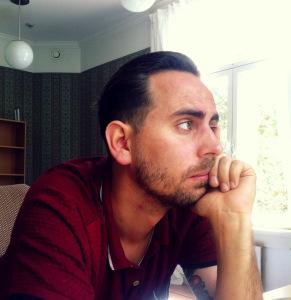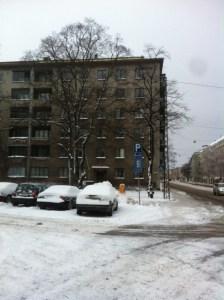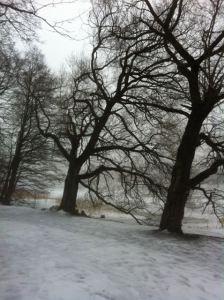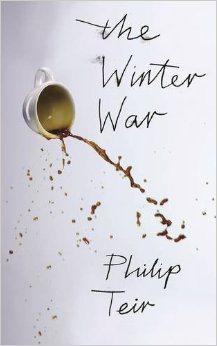Over the next few months I’ll be featuring some of the titles from my Hot Picks 2015 selection on the Literary Sofa, starting with a Writers on Location post about Helsinki by Finnish author Philip Teir, dubbed #Scanzen by his UK publishers Serpent’s Tail. I’m often sceptical about such tags but with his debut novel The Winter War (translated from Swedish by Tiina Nunnally) this author proves himself the equal of Franzen at his finest (which was The Corrections, in my view). I’m delighted Philip is joining me to share some personal insights about his home city, where the novel is set (my mini-review follows):

I had been watching the snowstorm from the window on Saturday night, with a childish urge to go out and stand in the middle of it. So I did what any 35-year old father-of-two does: when the children were asleep, I kissed my wife and went for a walk to the nearby pub. Nobody seemed to be out. The fresh snow had a muting effect on the whole city. As I drank my beer the street sign next to the window gradually turned white.

The family in my book, The Pauls, also live somewhere here, a bit closer to the city center. Max Paul is about thirty years older than I. His wife has a good job. He’s paid off all his mortgage loans. He is the kind of person I can imagine standing by the fishmonger’s in the department store, choosing expensive scallops for his Friday dinner, before he goes to buy wine for the weekend (I would probably have to settle for something cheaper myself).
Max is very privileged, but I think that he belongs to a generation – unlike myself – who feels that it has earned its privileges. When Max was born Finland was still very deeply affected by post-war poverty. He grew up watching the country go through that and become a welfare nation.
Max is Finland-Swedish, just like me. This needs some explaining: in Finland, about 5 percent of the population (of about 5,4 million) speaks Swedish. Some of these people are writers. The most famous one would probably be Tove Jansson, who was the one with the Moomin trolls. A brilliant “upper-middle-class lesbian bohemian”, as BBC called her during her centenary celebration last year.

I write my books in Swedish but I come from a bilingual family, just like the family I write about. It works like this: I went to a Swedish school, spoke Swedish with my siblings, but spoke Finnish with my mother. And I speak a lot of Finnish in my daily life in Helsinki.
When I wrote my novel I wanted to have this bilingual experience in there, so a lot of the people in the book are speaking both languages. But of course it’s not really possible to write a novel in two languages, if you want your readers who aren’t bilingual to be able to understand everything.
This isn’t necessarily very important for English readers. I think the point is actually the opposite: the family is a typical example of how the Finnish middle class has become more and more global. Just in three generations a lot of things have changed. So when I put the daughter Eva in London it was because it felt like something a person her age would do: move from Finland, to a more global setting.
Nationality becomes less and less important, it seems, but on the other hand we talk more and more about nationality these days. In Finland the populist party the True Finns (our version of Ukip) won 19 percent of the vote in the last parliamentary election. All of a sudden we have discussions about abstract things like “Finnishness”, and there are forces who start questioning the Swedishness of Finland. And in Sweden the Sweden democrats have managed to overrun the political debate, and almost forced the government to call for new elections recently. For us who consider Sweden to be a sort of forerunner when it comes to global modernity this anti-immigrant backlash seems out of place.

I also thought about nationality because of the tragic Charlie Hebdo massacre. When we struggle to find explanations to these kind of events we often talk about cultural identity. I took a pause from the writing of my next book when the events in Paris unfolded. It seemed so unimportant to try to make sense of fictional characters when everyone was trying to make sense of the world. I think writing fiction sometimes can feel trivial when things like this happen: that this is what one should be writing about, burning political issues. But trying to do so in fictional form isn’t always easy – just ask Michel Houellebecq.
My novel The Winter War has to do with smaller issues, in a very literal way, hamsters and things like that. But I think that the Strindberg quote in the beginning of the book is also true: “Life consists of trivial matters”. Even as major events unfold in the world, people have to deal with all the small things in their lives.
Especially so during the winter time, when the darkness effects everyone’s mood. Maybe the snow will help a little bit this year. We’ll see.
Thank you to Philip for contributing this thoughtful and very topical piece.

We’re all familiar with the seductive image/fantasy of the perfect Scandinavian society but in The Winter War as in real life, if you look a little closer, the cracks aren’t hard to see. This is the first family drama I’ve read set in Scandinavia (and the first book I’ve ever read set in Finland!) and whilst novels examining middle class anxieties have their detractors, there’s just so much narrative potential in all that striving, the concern with appearances, status, what other people think… Philip Teir inhabits his male and female characters of all ages with equal conviction and intensity, his take on relationships perceptive and intelligent. This novel manages to be both humane and satirical, poignant and funny. The writing sparkles in an excellent translation. I hope for everyone’s sake that the new Jonathan Franzen is this good.
*POSTSCRIPT*
Next week my guest on the Sofa will be bestselling author Shelley Harris, talking about writing a hero from the inside in her second novel Vigilante.

